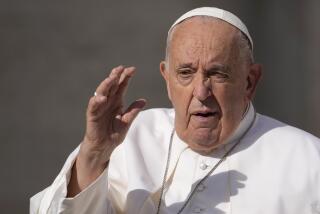God and gays
The U.S. Episcopal Church this week tried to appease conservative fellow Anglicans at home and abroad by reaffirming a promise to “exercise restraint” in approving sexually active gay bishops. The conciliatory statement, which followed some ecclesiastical shuttle diplomacy by Archbishop of Canterbury Rowan Williams, fell on mostly deaf ears among conservatives. One dismissed it as a “delaying tactic.”
Will conservative bishops formally defect from the Episcopal Church and align themselves with like-minded prelates overseas? Will Anglicans abroad break relations with the U.S. church? As this cliffhanger continues, it’s tempting to see the dispute as an intramural argument about theology. Conservative Episcopalians cite Scripture that condemns homosexuality, liberal Episcopalians counter with their own deconstruction of the Bible, and members of other faiths (or none) watch from the sidelines.
It’s not that simple. Like the last major dispute that bedeviled the Episcopal Church, over whether Scripture allowed the ordination of women as priests, the seemingly theological debate about homosexuality reflects changes in society as a whole. The first female Episcopal priests were ordained -- in defiance of the church’s General Convention -- in 1974, at a time when women were rising to leadership positions in secular society. Today, the presiding bishop of the U.S. church is a woman (an irritant for Anglicans from patriarchal societies). Likewise, the drive for full inclusion of gays and lesbians in all American churches has tracked a more general decline in homophobia.
Conservative critics of the American church, especially bishops from the so-called Global South, protest that Episcopalians are allowing their faith to be adulterated by the culture. But the conservative bishops who abhor homosexuality are themselves acting in a cultural context. Experts on Christianity in Africa note that some bishops there don’t want to seem “soft” on homosexuality for fear of losing converts to Islam.
In its long history, Christianity repeatedly has been divided and subdivided, and most of the issues that led one group to part company with another were “inside” issues of theology -- the authority of the Bible versus that of the pope, the role of “faith” and “works” in salvation, the nature of the sacraments. But others, like the dispute over American slavery that divided Northern from Southern Presbyterians in the 19th century, raged and resonated outside church walls. That is the case with the Anglican argument over gays, which is why so many non-Episcopalians -- and non-Christians -- are paying attention.
More to Read
Sign up for Essential California
The most important California stories and recommendations in your inbox every morning.
You may occasionally receive promotional content from the Los Angeles Times.










